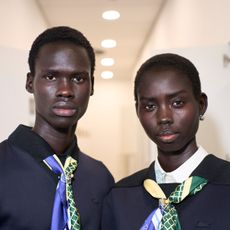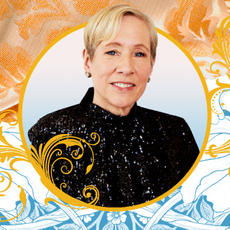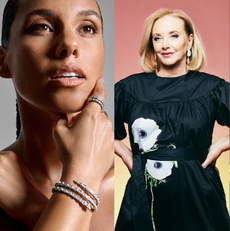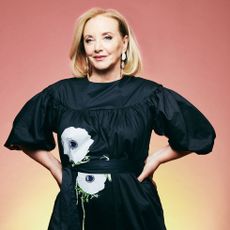It's 7 p.m. on a Wednesday, and New York Senator Kirsten Gillibrand hurries into a noisy Mediterranean restaurant in Manhattan. After a quick bite, she'll head to a fundraiser for the Democratic National Committee, where she'll introduce President Obama. Already today, she has discussed the price of milk in one upstate town and infrastructure for sewers in another. She has been awake since 3:30 in the morning, when one of her two young sons asked if he could watch The Berenstain Bears. (Answer: no.) At 4 a.m., she got up and did laundry. At 6 a.m., she went for a four-mile run. She looks like she's ready for another run right now. She's amped up — she's riled about an "all-out assault on women's rights," she says, in reference to the recent Republican push to try to cut off federal funds to Planned Parenthood. She drops her fork on the floor, and her aide searches for a waiter. "Don't worry about it," Gillibrand says. "I'll just wipe it off."
Gillibrand, 44, has been compared to Tracy Flick, the maniacally ambitious class-president candidate played by Reese Witherspoon in Election. Sure, Gillibrand is driven — and petite and blonde, with a blazing blue-eyed gaze — but she is also hardworking and no-nonsense. Since switching careers from law to politics, she has been instrumental in key measures such as passing the 9/11 health bill for rescue workers and repealing "Don't Ask, Don't Tell." We asked how she made it all happen.
You're one of only 89 women in Congress versus 446 men — and this year, the number of women in Congress declined for the first time in 30 years. What gives?
I think it's due to a number of reasons. One of the concerns that I have right now is that I believe too many women are sitting on the sidelines and aren't engaged in the issues that affect them. I'm particularly concerned about younger women — women 40 and under who are not engaged at all. Some of it has to do with the fact that women are busy; they're focused on their careers; they're focused on raising children. But a lot of women also believe that their voice doesn't matter, that their views are not important, and that their vote doesn't make a difference. And that's really what I want to challenge with American women.
Right now, less than 1 percent of women in Congress are under 40. I want to really work over the next few years to bring more women off the sidelines and get them engaged. To care about the policies and decisions that are being made because I don't want them waking up a year from now, two years from now, 10 years from now, and realizing that they don't agree with the laws that are being written and the agenda of this country because they didn't participate.
Speaking of agendas, what was with the recent Republican push to try to cut off federal funds to Planned Parenthood?
They want to make the debate about abortion. But it has been the law of the land for the past 30 years that federal money does not pay for abortion services — it pays for prenatal care, breast exams, cervical exams. This vote to cut off funds to Planned Parenthood was a radical anti-women agenda that women need to understand and be able to do something about. It's part of a misinformation campaign.
Stay In The Know
Marie Claire email subscribers get intel on fashion and beauty trends, hot-off-the-press celebrity news, and more. Sign up here.
When do you think this issue is going to come up again?
I think it will be a continual theme for the Republican leadership in the House.
Are women reluctant to get into politics because it's so brutal?
A lot of women choose not to run for office because they don't like the landscape. They don't want to be part of a culture they perceive to be rough or aggressive or dirty or corrupt. And it's a very, very combative industry. But the reality is that women make a difference. For example, I serve on the Armed Services Committee: When we're debating an issue of military readiness, the men and women on the same committee may look at that issue very differently, but both view points are relevant. So while my male colleagues might be focused on how many aircraft we're building in a certain year or how many ships we're building, often the women are focused on how are the men and women who are serving doing? Are they getting enough mental-health support? What's happening with their families? Are they mentally and physically able and ready to go back into combat over and over again?
You weren't afraid to roll up your sleeves and run.
Well I had some very good role models. The first role model in my life was my grandmother—she ran a Women's Democratic Club, and they used politics as a vehicle to be heard. My grandmother received bad press and she didn't care. And so I never was afraid; I was never worried about whether it would be too difficult or too aggressive because I watched her do it so gracefully and with such great joy. Also I'm a realist; I understand the playing field. It's not an easy game — politics can be very muddy. But if you work hard and have a vision for what you want to do for the people you represent, and if you explain how you will accomplish that vision, people will listen.
Hillary Clinton was also an inspiration to me. I was very inspired when she gave her speech in China where she was defining women's rights as human rights. I was impressed when she went to Beijing because that was a very transformational speech, and I had been an Asian-studies major at Dartmouth; I had learned Mandarin, and I had been to Beijing. I was so moved by what she did and what she said, it really challenged me to think about what I was doing with my life and whether I was making a difference.
When did you first meet Hillary?
I met her probably a year later after she gave that speech. I called a friend's mother who was very involved in national politics and asked, "How do I get involved in politics in New York City?" She said, "Join this women's group called the Women's Leadership Forum." So I joined that group, and Hillary and Tipper Gore were the national co-chairs of the group. I got to meet Hillary at an event.
Are the media tougher on women candidates?
I wouldn't describe it as tougher, but the focus is different. And that's just the nature of things. If you remember, during the presidential debate, almost every commentator would assess what Hillary Clinton was wearing. There was no equal assessment of what the male candidates were wearing. But that is the nature of our society.
You were a Manhattan lawyer when you decided to move home to Albany and pursue a political career. By the time you ran for the House, in 2006, you had raised $2.6 million for your campaign. How did you raise so much money? And how would you advise other women to launch a campaign?
First, a woman should run for the office she's most passionate about. If there's something she wants to change, something she wants to make a difference on, that is what should drive her decision. Nothing else. Not the "that's too senior for me" or "I'm not prepared for that job." It should be: "What are you passionate about?" If you're passionate about education, run for the school board. If you're passionate about changing the way the U.S. educates children more broadly, run for U.S. Congress. Second, be prepared, and that means learning what it takes to run a successful campaign. I went to three campaign training schools before I ran for office: I went to the Women's Campaign School at Yale for a week; I went to the Eleanor Roosevelt Legacy Campaign School; and I went to the Women's Campaign Fund Training School. Third, know what you're getting into. I spent about 10 years working on other people's campaigns. I worked on both of Hillary Clinton's Senate races. I worked Bill Clinton's Presidential race in '96. I worked on a number of gubernatorial races in New York. And the reason why I learned how to fundraise was when I was interested in a candidate, and I asked, "How can I help? They said, "Will you host a party will you help me meet people and raise funds that I need for my campaign?" So I learned how to network well to help candidates. I networked with women, with lawyers; I was able to create advocates for the candidates that I cared about. The other advice I would give to a woman who is considering running: If she decides to run, then run. Do not look back, and do not give up. You have to stay the course, stick with your plan, follow through on your plan, and you can win. But you have to stay determined because it's never going to be easy. It's always going to be difficult.
What your biggest disappointment in your political career?
I'm very concerned about the statistic that you referenced earlier, that this is the first year in 30 years that fewer women were elected than in any previous year. I'm worried that the women's rights movement has been significantly stalled. We're fighting the battles of our grandmothers and mothers. We are not fighting the future battles. We are not moving the debate forward. The fact that women still earn 78 cents on the dollar for men is an awful statistic that shows an unacceptable disparity. It was just released today that women are now getting more graduate degrees than men. We've just turned the corner. But the reality is that will not affect the pay gap. Because women are paid less in all major industries. Even in industries where more women work than men. If you look at nursing, women are paid 87 percent of what men are. If you look at teaching, it's 91 percent of what men are paid in the same profession.
What's being be done about it?
The first bill that the President signed into law was the Lilly Ledbetter bill, which basically allows women to sue and not to have a statute of limitations. So, for example, you found out today that all your male colleagues get paid more than you, you can sue, even though it might have been over the last five years. And then the next step is to give access to information to women so that they know they are being underpaid, so they could do something about it. We've been working on a bill called the Pay Check Fairness Act. It was introduced by Barbara Mikulski, and, among other things, it prohibits employers to retaliate against workers who discuss their salaries with coworkers. Currently it's difficult for workers to learn how their pay compares to fellow employees, because many employers prohibit employees from discussing their salaries.
That's why we need women in Congress. Speaking of which, you're good friends with Congresswoman Gabrielle Giffords. How did you become close?
I got to know Gabby right away because she was one of the few young women in Congress. We immediately gravitated toward each other and we became friends right away. And we also served on Armed Services together. And over time, her and her husband and my husband and me, we'd go on double dates.
You were there for that stunning moment when she first opened her eyes after the shooting.
That whole day was beyond my understanding and comprehension. I was so grateful that I got the chance to see her. We were all in the hospital room: Her parents were there; her chief of staff was there, along with Debbie Wasserman Schultz and Speaker Pelosi. And we were just holding her hand and telling her how much we love her and how inspiring she had been to the nation, and that we knew she was a fighter and we couldn't wait for her to get better. Then we started talking about all the things we wanted to do with her. And I said I wanted to take her and her husband out for another double date. And Debbie was saying, "We'll go up to my house in Vermont, and we'll have fun this summer." And just all of a sudden, while I was holding her hand, she was just fluttering her eyes. And we didn't realize she hadn't opened her eyes yet. So when she started fluttering her eyes, her husband leaped across us and said, "Gabby, Gabby, open your eyes, open your eyes!" You can't imagine being in a hospital room with a sick person like that coming to life in a very real and immediate way. And then she opens her eyes and Mark is beside himself and he says, "Gabby, Gabby, can you see me? Can you see me?" And he said, "If you can see me, give me the thumbs up." And we're just crying. I mean, you can't believe that we're watching this moment of a husband who clearly loves his wife and is pulling her to recovery with every inch of his being. All of a sudden, she just pulled her whole arm up. So it was like a full-arm thumbs-up. And we couldn't believe it. We were just gushing with tears and joy and this unbelievable moment of witnessing a miracle.
We got to stay for maybe two minutes more, and then the doctor said, "Gabby's had enough excitement. Thank you all for coming, but she needs her rest now." So we kind of got shuffled out of the room, but it was a window onto a miracle that you are so privileged to be part of. It just was another testament to how strong she is and how much her family and her husband love her. The doctor said it must have been the familiarity of friends and the excitement of being with friends.
Have you seen Gabby recently? How is she doing?
I was there a few weeks ago. She's talking in short sentences. She's communicating her ideas very effectively. She's got every bit of her personality intact. She's as charming and sweet and happy as anybody. And she's determined. She's been doing physical therapy and speech therapy everyday. And she's going to heal herself. She's going to overcome this violence done to her. And she'll continue to inspire all of us.
On the home front, you're married, with two kids. And of course there's your all-encompassing job. Who told you that you could do it all?
My mother was a very important inspiration in my life. In her law-school class, there were only three women. She's a very determined woman who's very independent and did a lot of things that her peers never did, and it gave me enormous courage and really the confidence that I can do anything I want to do, that I don't have to do things the way everybody else does. You know, a funny story: Six of my best girlfriends had mothers who were stay-at-home mothers, and so, 5 out of 6 of my friends became lawyers, because the only working woman we knew was my mother. It's really funny.
Your mother also helped inspire your work to repeal "Don't Ask, Don't Tell," correct?
Very much so. When I was growing up, my mother's gay friends had families just like our family. And so it never occurred to me that we should discriminate against gay men and women for who they are, for who they love. When I realized that there wasn't a great deal of movement in repealing "Don't Ask, Don't Tell" when I first joined the Senate, it became an issue that I thought I could make a difference on. I thought, I can push this; I can work with my colleagues; I can create a coalition of support to repeal it. I asked Chairman Levin to hold the first hearing — the first hearing in 16 years. Through that hearing, we got the testimony of Admiral Mullen, when he said that he believed it undermined the whole integrity of the armed services. That was a very valuable testimony for getting a few undecided democratic votes.
When you began that battle, did people tell you to forget it?
Yes. Even some of the advocacy groups thought it was a waste of time or that it wouldn't be successful. They said, "We don't believe a legislative solution is the right approach. We think we should ask the White House to take the lead on this." And I said, "Yes, we should definitely ask the White House to take the lead on this, but fundamentally this is a law on the books, and if it's there, it will be used against gay men and women at some point in the future. We don't know who the next administration is; we don't know what the future will bring; we have to repeal the law."
So, my view was: You might be right — it might be difficult or impossible, but we have to fight for it. This can't be part of our laws: We cannot institutionalize discrimination. Because it's bad for our national security. And it's unfair and unjust and fundamentally discriminatory against gay Americans. And it's a corrosive policy. Because if you look at, the military is based on integrity and loyalty and courage and honestly and character, except if you're gay, then you had to lie about everything. It was incongruous to the whole core of military values.
On a personal note, you've lost 40 pounds in the last year or so. What's your secret?
After I had my second child, Henry, I nursed him for about a year. And after I was done nursing, I decided I want to take my health and fitness seriously and get back to my regular self. And a friend of mine mentioned, "You know, Kirsten, you love sports. Why aren't you playing sports? It's something you always done." I thought, Gosh, she's right. I haven't made time for myself. I haven't made time for myself since I was married. I had stopped playing sports. I thought, What a great idea. I started playing tennis again; I started playing squash again; I started running. And I took my diet very seriously. I went on a very serious diet. I've been eating fruits and vegetables, lean meats and fish, low-fat dairy, complex carbs only in the morning. I was determined to get back to my regular self. And so over a year, I lost 40 pounds, and I became much fitter and much stronger. And now my squash game is better than it's ever been. And my tennis game is better than it was in college. And so I'm getting stronger, fitter, and trying to take that little bit of time every day.
It's hard for young mothers, to be honest. To take that time for ourselves because we're trying so hard to juggle family life and professional life. And when we have even an ounce of time free, we want to devote it to our children, and so really, I certainly felt selfish if was spending any time in the gym or any time working out because I wasn't with my children. And so for me, it was important to say, a fit mommy is a happy mommy. So it's good for the kids if I have that moment every day to do something that makes me healthier.
What's your guilty pleasure?
Going to a dinner and a movie with my husband. That is a delight.
Favorite movie?
I love all the old movies: Rear Window, Vertigo, To Catch A Thief, All About Eve.
Any new films you like?
I watched a great movie recently called The Way Back. An unbelievable movie about a group from Siberia that broke out of a gulag and walked to India and survived. Through Mongolia across the Himalayas. It was an unbelievable story of drive and dedication and a will to live that inspired me.
How'd you find time to see that?
I saw it on the plane!
What are you reading?
Bossypants by Tina Fey and Knowing Your Value: Women, Money and Getting What You're Worth by Mika Brzezinski.
Team Angelina or Jen?
I like them both! For different reasons.
What reasons?
I think Angelina Jolie plays strong female characters in her films, and seems to be very physically fit. And Jennifer Aniston often plays the girl next door, who I also admire. I like both of them!
Abigail Pesta is an award-winning investigative journalist who writes for major publications around the world. She is the author of The Girls: An All-American Town, a Predatory Doctor, and the Untold Story of the Gymnasts Who Brought Him Down.
-
 'Baby Reindeer' Is Netflix's Latest Viral Hit—Will It Get a Season 2?
'Baby Reindeer' Is Netflix's Latest Viral Hit—Will It Get a Season 2?The miniseries from Richard Gadd has a very definite ending.
By Quinci LeGardye Published
-
 The Best Unisex Perfumes Were Made to Be Shared
The Best Unisex Perfumes Were Made to Be SharedYours, mine, and ours.
By Sophia Vilensky Published
-
 The Spice Girls’ Mini-Reunion at Victoria Beckham’s 50th Birthday Party Is a Precursor for a Forthcoming Tour, Sources Say
The Spice Girls’ Mini-Reunion at Victoria Beckham’s 50th Birthday Party Is a Precursor for a Forthcoming Tour, Sources Say“I’ll tell you what I want, what I really, really want”...is this to be true.
By Rachel Burchfield Published
-
 Documentaries About Black History to Educate Yourself With
Documentaries About Black History to Educate Yourself WithTake your allyship a step further.
By Bianca Rodriguez Published
-
 Almost Famous
Almost FamousHalf of the Shondaland dream team, the woman whose work brings 'Bridgerton' to life, is one of the most influential producers in Hollywood. And she’s ready for everyone to know it.
By Jessica M. Goldstein Published
-
 Payal Kadakia Is Finally Sharing Her Secret Sauce to Success
Payal Kadakia Is Finally Sharing Her Secret Sauce to SuccessIn her new book, LifePass, the ClassPass founder gives you the tools to write your own success story.
By Neha Prakash Published
-
 The Power Issue
The Power IssueOur November issue is all about power—having it, embracing it, and dressing for it.
By Marie Claire Editors Published
-
 J. Smith-Cameron Is in Control
J. Smith-Cameron Is in ControlShe’s Logan Roy’s right hand. She’s Roman’s ‘mommy girlfriend.’ And she’s a fan favorite. Here, the Succession star takes us behind the scenes of Gerri’s boardroom power plays.
By Jessica M. Goldstein Published
-
 More Than A Pretty Face: Anna Schuleit
More Than A Pretty Face: Anna SchuleitGerman-born artist Anna Schuleit went from anonymous to Einstein virtually overnight, thanks to a call from the MacArthur Foundation announcing that she'd won a 2006 "Genius" grant for $500,000.
By Katherine Turman Published
-
 In 'We Are Not Like Them' Art Imitates Life—and (Hopefully) Vice Versa
In 'We Are Not Like Them' Art Imitates Life—and (Hopefully) Vice VersaRead an excerpt from the thought-provoking new book. Then, keep scrolling to discover how the authors, Jo Piazza and Christine Pride, navigated their own relationship while building a believable world for Riley and Jen—best friends, one Black, one white, dealing with the killing of an unarmed Black boy by a white police officer.
By Danielle McNally Published
-
 Love Has Lost
Love Has LostQuasi-religious group Love Has Won claimed to offer wellness advice and self-care products, but what was actually being dished out by their late leader Amy Carlson Stroud—self-professed “Mother God”—was much darker. How our current conspiritualist culture is to blame.
By Virginia Pelley Published